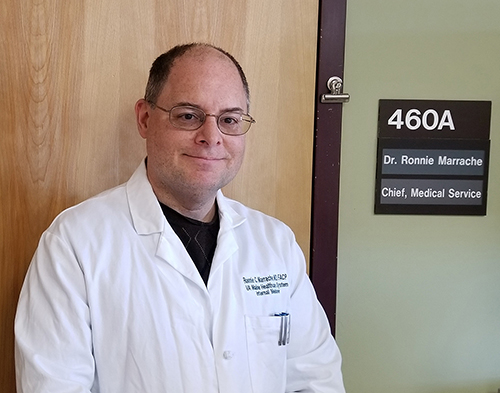VHA SimLEARN
VA doctor helps save critically ill Veteran; Simulation training aids effort
By Gerald Sonnenberg
EES Marketing and Communication
AUGUSTA, Maine – Medical professionals are relied upon for their skill and heart during the most trying of times. They can also provide hope when situations seem their darkest. On a dreary evening Feb. 21, the winter weather in Maine was wet, foggy and cold as Dr. Ronnie Marrache, chief of medical services at the VA Maine Healthcare System in Augusta, arrived at a small, community hospital where he sometimes cared for patients.
Though not a Veteran himself, Dr. Marrache comes from a family of Veterans, and the VA clinician has spent nearly 17 years caring for Veterans with a passion. The New York native had just completed refresher training of sorts through a Fundamentals of Critical Care Support (FCCS) course at the VHA SimLEARN National Simulation Center in Orlando, Florida. The course would soon prove itself useful.
FCCS uses simulation to introduce important principles in the initial care of critically ill/injured patients to physicians, physicians-in-training, nurses and other health care providers. These providers may or may not be skilled in critical care, but they must be able to care for such patients during early stabilization and in anticipation of the arrival of an intensivist, specialist, or pending transfer of a patient to a tertiary center.
Dr. Marrache arrived early at the small hospital to work. A short time earlier, a Marine Veteran arrived by ambulance in the emergency room (ER) with acute respiratory failure and shock. The ER team intubated him and started critical services (fluid, antibiotics, vasopressors, etc.) in the emergency room. Dr. Marrache heard what was going on and went to the ER to assist.
“As this is a small community hospital with five intensive care unit (ICU) beds, they wanted to transfer the patient to a tertiary care facility,” said Dr. Marrache. “However, every facility in Maine (including the VA) was closed to admissions due to being at capacity, and the weather was such that medical airlift was not flying. The only choice was to keep the patient.”
Dr. Marrache spoke with the family and explained that while a larger medical care facility with a critical care physician was the most optimal, that they would need to keep him this night. The family agreed.
From that point on, Dr. Marrache and the rest of the medical team fought to save the critically ill Marine. Dr. Marrache explained that anesthesia helped with an arterial line and a central line. “The patient had septic shock, which was likely from a poorly treated urinary tract infection and sub-optimally controlled diabetes,” he said.
The patient needed dobutamine support briefly and suffered a Non-ST-elevation myocardial infarction or NSTEMI (a heart attack) during the ordeal.
“But with the proper treatment – all things I had studied intently on the week before at FCCS – he did extremely well,” said Dr. Marrache. “By the morning he was on half the oxygen originally needed, he was off the dobutamine, and his norepinephrine drip was half of what it had been. He ultimately made it to a local tertiary care facility the next day.”
Critical care events like this happen now and then. In smaller hospitals like this one, these cases typically get shipped to larger care centers or are bypassed altogether. Hospitalists and emergency physicians working in more rural facilities do not always get to see these cases. Nonetheless, these types of cases do come in.
Dr. Marrache said, “The FCCS course, for me, brought back to the surface all of the essential elements of the critical care training I received in my residency. The training, combined with access to eICU (when at a VA facility) could easily be the difference in survival for some.”
For more information about the FCCS course, click here.
Dr. Ronnie Marrache stands outside his office at the VA Maine Healthcare System in Augusta. (VA courtesy photo)



















